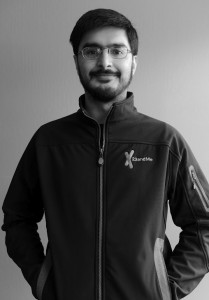
What would you do if you found out that you had a rare and possibly life-threatening genetic mutation? You’d probably talk to relatives about your family medical history. You’d likely visit your doctor and maybe a specialist. You might even change your diet and exercise routines. Arnab Chowdry did all that and more. Arnab worked with other researchers to uncover the biological ramifications of the genetic mutation he carries and is presenting the findings at a national meeting of geneticists.
Arnab is a Senior Manager of Platform R&D at 23andMe and recently discovered he carried a variant in the MYBPC3 gene that is associated with familial hypertrophic cardiomyopathy (HCM). This was sobering news; HCM is most common cause of sudden cardiac death in young athletes by thickening the heart muscles and interfering with blood flow. As he has blogged about, his particular genetic mutation is considered a “variant of unknown significance.” That is just another way of saying the scientists don’t know very much about it. As a scientist himself, however, Arnab was in a position to change that.
![]()
You, too, can contribute to research! How? One easy way is to answer the research surveys at 23andMe.
Not yet a customer? Visit our store!
Over 160 other 23andMe customers also carry Arnab’s mutation. Arnab, however, wasn’t able to verify the connection between HCM and the mutation in the 23andMe database because most people do not know their HCM status. Often a person doesn’t know they have the condition until it is too late, making association studies difficult.
Instead of studying the mutation in individuals, Arnab simplified the equation by considering the effect of the mutation in just isolated cells. He teamed up with Mohammad Mandegar from the Gladstone Institute, an independent research institute that focuses on biomedical research. Mandegar and his team are creating cells that contain Chowdry’s mutation and hope to see how this mutation impacts cell function.
In keeping with 23andMe’s dedication to sharing its research discoveries with the broader scientific community, Chowdry will be presenting the initial findings from his and Mandegar innovative collaboration at the upcoming annual American Society of Human Genetics (ASHG) conference. His poster illustrates how science can move forward when individuals own their genetic data.



